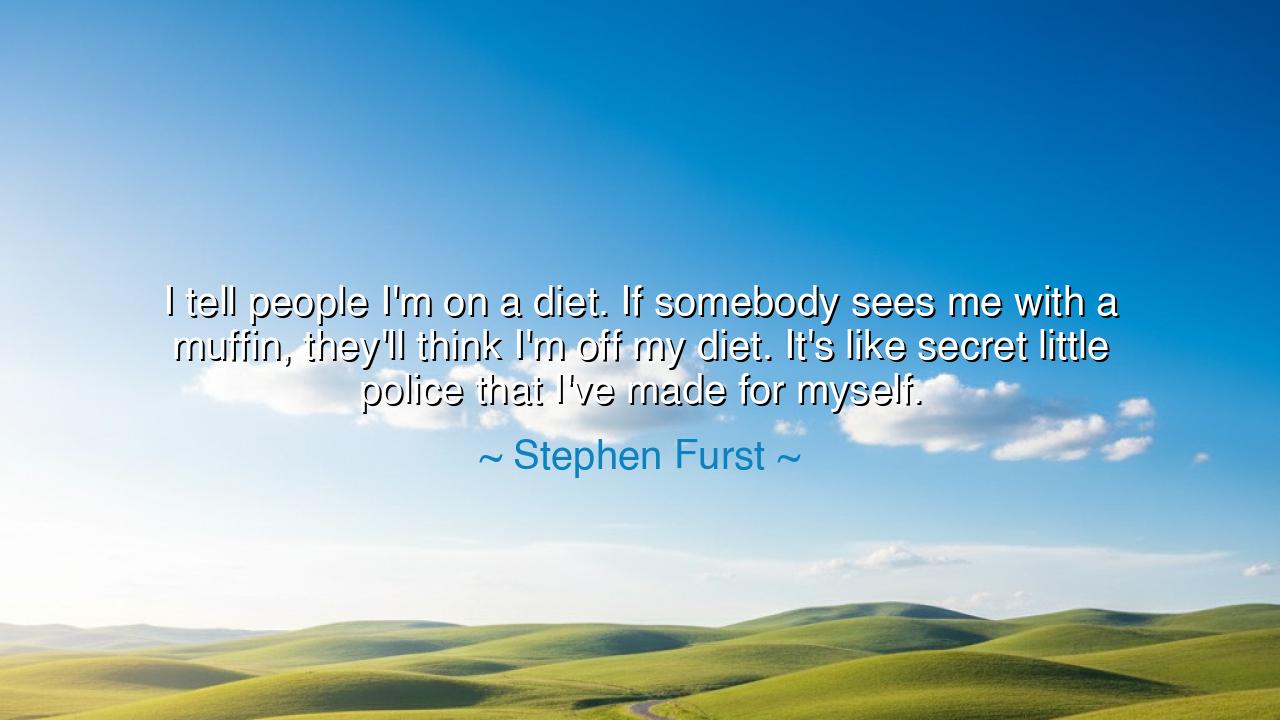
I tell people I'm on a diet. If somebody sees me with a muffin
I tell people I'm on a diet. If somebody sees me with a muffin, they'll think I'm off my diet. It's like secret little police that I've made for myself.






In the great journey of life, we often find ourselves bound by the promises we make to ourselves—promises of discipline, of resilience, and of control over the temptations of the world. Stephen Furst expresses this struggle beautifully when he says, "I tell people I'm on a diet. If somebody sees me with a muffin, they'll think I'm off my diet. It's like secret little police that I've made for myself." In these words, we hear a powerful truth: the conflict between our inner desires and the judgments of others is a constant battle. The diet becomes more than a mere plan for health—it becomes a mirror to our own insecurities and the external expectations we often feel compelled to meet.
Consider, children, the wisdom of the ancient Greeks, who believed that true strength was not found in the external world but in the self-control we exert over our own desires. Socrates, though known for his profound insights into the nature of virtue and wisdom, often spoke of the importance of moderation in all things. To him, true freedom was not the indulgence of pleasure, but the ability to choose wisely and live in harmony with our principles. This inner conflict, which Furst alludes to, is not new—it is as old as time itself. To diet, to exercise restraint, is to face both our desires and the judgments that others impose upon us. The muffin, in this case, is a symbol—not just of temptation, but of the larger struggle between personal freedom and societal expectations.
In Rome, the great Cicero also understood that the human condition is often torn between the self-imposed disciplines of the soul and the external pressures of society. He wrote of the importance of integrity—to live according to one's own values, even when others did not understand. Just as Furst describes his internal “secret police,” we too often feel the gaze of others on our actions, as though our every choice were scrutinized by unseen judges. The act of dieting, then, becomes more than about food—it becomes an exercise in willpower, in choosing not only what is good for the body but also what aligns with the expectations we place on ourselves. In this, we are constantly navigating between personal desire and the judgment of the world.
Look also at the life of the Spartan warriors, those mighty individuals whose existence was built on discipline and control. Their training was grueling, their diets austere, for they knew that true strength did not come from indulgence, but from strict self-regulation. Yet even they were not free from the scrutiny of their fellow warriors. The Spartan system, while offering an unparalleled sense of unity and purpose, also required a constant awareness of how others saw them. In a sense, the Spartans, too, were governed by their own form of "secret police"—the collective expectation that they would always adhere to the code of strength, virtue, and endurance. Like Furst's internal dialogue, the Spartans were held accountable not just by their personal goals, but by the unspoken expectations of the community around them.
And so, my children, the lesson here is clear. We, too, must learn to walk the path of discipline and moderation, not just for our own health, but for the preservation of our integrity. The internal struggle that Furst describes—the conflict between personal desires and external judgments—echoes through the corridors of time. It is not merely about choosing what to eat, but about choosing how to live. In every decision, we must ask ourselves: Are we following the path of moderation because it brings us true peace, or are we simply conforming to the expectations of others, be they real or imagined?
In your own lives, children of the earth, remember that true freedom does not lie in the avoidance of temptation, but in the conscious decision to live in alignment with your deepest values. The "secret little police" we create for ourselves, though often rooted in good intentions, can become a form of internal tyranny if we are not careful. Strive for balance, not for perfection. Live in a way that honors your body, but also your soul—choosing what nourishes you not out of fear or judgment, but out of a deep, authentic understanding of what is truly good for you.
So, I say to you, children, choose wisely, and choose freely. The path of discipline is not about succumbing to the gaze of others or adhering to arbitrary standards; it is about the quiet strength to follow your own path, to find the balance between self-respect and self-compassion. Honor your body, honor your choices, and live with the freedom that comes from making decisions not based on external pressure, but on the quiet wisdom that resides within.






AAdministratorAdministrator
Welcome, honored guests. Please leave a comment, we will respond soon